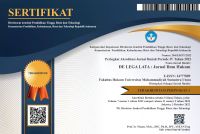Development of a Model of Utilizing Cash Wakaf to Realize a Legal Tourism Area in Medan City
Abstract
Keywords
Full Text:
PDFReferences
Alasqalani, A. H. B. H. (2004). Bulughul Maram. Cv .Wicaksana.
Arif, S. (2010). Wakaf Tunai Sebagai Alternatif Mekanisme Redistribusi Keuangan Islam. LA Riba: Jurnal Ekonomi Islam, 4(1), 9394.
Azam, A. A. M. (2010). Fiqih Muamalat. Amzah.
Fajar, M., & Ahmad, Y. (2010). Dualisme Penelitian Hukum Normatif dan Emfiris, Pustaka Pelajar. Pustaka Pelajar.
Handayani, D. (2011). Pengelolaan Wakaf Uang Di Indonesia. Dinas Pendidikan Provinsi Banten.
Indonesia, S. M. U. (2011). Himpunan Fatwa MUI Sejak 1975. Erlangga.
Masyarakat, D. P. W. D. J. B. (2007). Pedoman Pengelolaan Wakaf Tunai. Direktorat Jendral Bimbingan Masyarakat.
Moshin, B. A., & Rodrigues, H. (2020). Halal tourism is traveling fast: Community perceptions and implications. Journal of Destination Marketing and Management, 18(1).
Nurchaliza, V. (2018). Pemanfaatan Endapan Dana Haji dalam Menunjang Pengembangan Daerah Wisata Ramah Muslim di Indonesia Melalui Wakaf Produktif. Al-Awqaf: Jurnal Wakaf Dan Ekonomi Islam, 11(1), 101108.
Penyelenggara, Y. (2005). Al-Quran & Terjemahnya. PT. Syaamil Cipta Medika.
Saptono, I. T. (2018). Pengembangan instrumen wakaf berbasis investasi sosial studi wakaf linkeded sukuk. Al-Awqaf: Jurnal Wakaf Dan Ekonomi Islam, 11(2), 117128.
Sari, C. A., Permata, A., & Hidayati, N. (2019). Optimalisasi Wakaf Produktif untuk Kesejahteraan Umat. Insight Islamic Economy Bulletin Komite Nasional Keuangan Syariah, 4(1), 10.
Singagerda, S., F. I., O., R., B. H., & Kustiari, R. (2013). Analisis Aliran Investasi dan Perdagangan Pariwisata di Indonesia. Bina Ekonomi Majalah Ilmiah Fakultas Ekonomi Unpar, 17(2), 5765.
Suherlan, A. (2015). Persepsi Masyarakat Jakarta Terhadap Islamic Tourism. The Journal of Tauhidinomics, 1(1), 6172.
Sunggono, B. (2015). Metodologi Penelitian Hukum. PT. RajaGrafindo Persada.
Supramono, G. (2002). Hukum Uang Di Indonesia. Gramata Publishing.
Usman, R. (2009). Hukum Perwakafan Di Indonesia. Sinar Grafika.
Wakaf, D. J. B. M. I. D. P. (2015). Tanya Jawab Tentang Wakaf Uang. Kementerian Agara RI.
DOI: https://doi.org/10.30596/dll.v8i1.12765
Refbacks
- There are currently no refbacks.
Address:
Faculty of Law, University of Muhammadiyah Sumatera Utara Jl. Kapten Mukhtar Basri No. 3 Medan, Kode Pos 20238
E-mail: delegalata@umsu.ac.id
Telp/HP/WA : 081262102097
DE LEGA LATA: Jurnal Ilmu Hukum is abstracting & indexing in the following databases:
De Lega Lata: Jurnal Ilmu Hukum is licensed under a Creative Commons Attribution-ShareAlike 4.0 International License.
Statcounter










